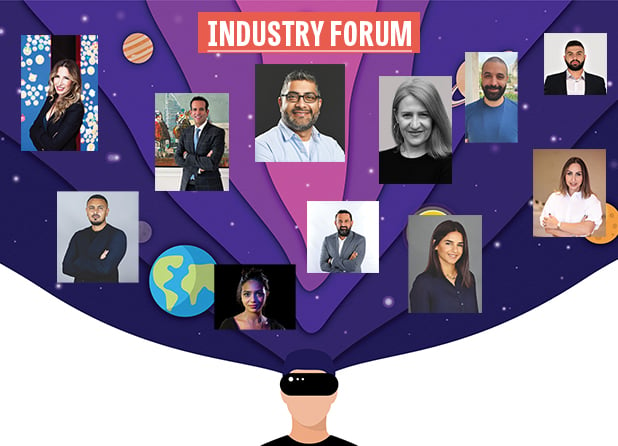
 Katie Streten
Katie Streten
Experiential strategy director, VMLY&R Commerce
Yes
Have you watched a child or a teen playing with their friends on Roblox or Fortnite? While building mansions, killing monsters, playing hide and seek or adopting pets, they chat to each other as if they are in the real world. There’s no distinction in their play. To them, these platforms are just another space, like the swingpark. They will evolve and drive functionality in metaverse spaces, taking us with them, so that not just play and relationships but work too will partly take place there. Redefining everything from rights to criminal behaviours to currencies, it’s already happening. Just watch.
 Toseef Butt
Toseef Butt
Head of performance marketing, Boopin
Yes
The metaverse will shape society more than social media ever did, with social platforms being the catalyst that drives usage and engagement. It will affect not only the way we engage with society and communicate but also the way we digest information and make decisions.
From meetings and conferences to product launches and movie premieres, these will all be hosted in the metaverse.
For some, the appearance of their avatars will hold more value and significance than their real-world appearance, with NFTs being a key driver of this.
Lastly, the metaverse will also create new career opportunities such as digital fashion designers, smart contract lawyers, metaverse event directors and metaverse world builders.
 Mazen Jawad
Mazen Jawad
President, Horizon Holdings
Yes
The metaverse is “a shared virtual three-dimensional world or worlds that are interactive, immersive and collaborative” (Nvidia), enabling at times countless of people to interact, play, work and live.
For the metaverse to shape our society, it needs to change the way we live, work and play. While this started slowly in the 1990s, it just had an incredible boost since Covid-19 locked us down and moved us into the virtual world.
Today we work and meet more online and this is quickly transforming – whether with Facebook’s Horizon Workrooms, a VR version of Zoom or Microsoft’s Teams software with new features that will enable companies to create immersive spaces where employees can meet.
The world is playing on platforms that keep evolving. MMORPGs (massively multiplayer online role-playing game) is here to stay; Fortnite, Roblox and Minecraft have become not only playrooms, but brands that sell and grow constantly. We see brands scrambling to get into Roblox while Balenciaga is selling Fortnite shirts.
And to enrich our lives further, Apple is rumoured to be launching a MR (mixed reality) headset and AR/VR glasses by end of next year. The metaverse is here to stay and evolve, surely transforming the way we live, work and play.
 Derya Matras
Derya Matras
Vice president, Meta Middle East, Africa and Turkey
Yes
The metaverse will be the next evolution in online social technology and will help us connect in ways not yet possible today. Because of that, I believe it will most probably have a big impact on how we interact as a society. It’s not about replacing being together in person, but when that’s not possible I think we can all agree that there is still a lot to do to improve that digital experience.
We envision it to feel like a hybrid of today’s online social experiences, sometimes expanded into three dimensions, or projected into the physical world – and seamlessly stitched together so that you can easily jump from one thing to another. And because it is immersive and engaging, it makes it easier to really feel like you are experiencing things together – through sharing a space rather than simply a screen.
 Vishal Badiani
Vishal Badiani
Creative strategy lead, Snap Inc. MENA
No
Metaverse is just sort of the new word for cyberspace. It isn’t a term we have applied to our work, which I’m relieved about now that it has become an explicit marketing play. The term originates from Neal Stephenson’s early 90s sci-fi novel Snow Crash, which coined it as a virtual world, operated by a monopolistic villain, where people went to escape reality – hardly a blueprint for a healthy society. In conversations on the topic today we see people conflating VR with AR, but they are two totally distinct approaches to building immersive computing platforms. Stephenson himself said VR and AR are: “completely separate and almost unrelated. The purpose of VR is to take you to a completely made-up place, and the purpose of AR is to change your experience of the place that you’re in.”
As we build towards the next generation of computing, it’s really important to distinguish the two, which is why we focus our technology and our conversations around AR, which we see as the most compelling and also healthiest path forward.
 Vanessa Abi Faris
Vanessa Abi Faris
Performance media manager, Dentsu
Yes
Without a doubt. Social media has greatly affected and revolutionised society, building on a foundation that’s progressed tremendously over the years, and strengthening communication, connectivity, and social interactions across the globe.
The metaverse is now the next big thing that will transform, yet again, the way people interact and connect with one another. So many questions are to be answered: if and when the metaverse will roll out, whether it will be decentralised or dominated by main players like social media is, and the impact it will have on authenticity and human connections, the various sectors, and the economy. One thing is for certain though, it will be ground-breaking.
 Hala Lababidi
Hala Lababidi
Director of digital sales, FutureTech
Yes
The metaverse is already shaping society and it is only in the very early stage of web 3.0. Every important part of life is gradually moving into the digital realm. Social media has become an essential part of our lives and the metaverse will become an even greater part of our lives within the next three years.
We are currently in a new era where we live more in the digital world than the physical.
With people already spending a huge part of their attention on social media, it is expected that the metaverse will be virtually indistinguishable from analogue life in the near future.
Metaverse representation, be that currency, profile or other assets, will become a necessity to use while shopping, working or simply carrying out day-to-day tasks.
Many brands have already started placing items that can be exchanged in the digital world such as digital assets, virtual outfits, NFTs, avatars and more.
 Walid Sanjad
Walid Sanjad
Social media director, Netizency
Yes
Social media changed the world, but the metaverse could quite literally be a whole new world, with its own economies, politics, real estate, experiences, and more. Technology – and its adoption – are progressing exponentially, and it’s only a matter of time before our avatars are virtually working, shopping, waging war, or having a Big Mac at our nearest Meta-McDonald’s. At time of writing, the word ‘metaverse’ is flagged as a typo – next thing you know it’ll be Oxford’s word of the year. All this is to say if there’s one thing we’ve learned from science fiction it’s that it eventually comes to pass – it’s just a matter of when.
 Lara El Khoury
Lara El Khoury
Regional senior marcom manager, Digital Media Services
Yes
And much more. Like social media disrupted the digital marketing landscape 20 years ago, the metaverse will revolutionise the way we socialise, shop, play, work, etc. It will reshape the world we live in and create huge opportunities for brands to interact with their customers in a 3D form. Retailers will be able to leverage new VR and AR technologies to provide a more comprehensive ‘omnichannel’ shopping experience that brings the physical and digital worlds together. On the downside, social media affected undesirably our society by creating issues with democracy, privacy and mental health. Let’s be realistic, despite its many benefits the metaverse will inevitably have some shortcomings, including losing track of time, the inability to distinguish between the real and virtual worlds and addiction, to only mention a few.
We are preparing for a new version of the internet which will have huge implications for society. The metaverse will definitely unleash amazing creativity, opening up new horizons for brands and businesses.
 Elie Chammas
Elie Chammas
Client relationship director, Fusion5
Yes
The metaverse will reshape society as we know it. It will have a fully functioning revolutionary economy with a new generation of currency and payment. Users tend to interact with new trends and especially highly influential ones, and that is what the metaverse aims to achieve. The metaverse is an attempt to rebuild the digital world from messaging, gaming and social media to e-commerce real estate and finance. The metaverse might one day resemble our world and our world will resemble the metaverse in a way where they are merged in necessity with each other and are co-dependent.
 Naveen Chacko Mathews
Naveen Chacko Mathews
Head of business unit – client service, Havas Media – Havas Middle East
Yes
But over the longer term, the biggest dependency being technological advancement and its access to mainstream audiences. Social media was driven by the inherent craving for social acceptance and connection. With people getting more accustomed to virtual ways of interaction, accelerated by the onset of Covid-19, a natural progression would be the need to find more immersive, natural-like ways to interact virtually. This, fuelled by a growing population – a younger audience who’d rather interact virtually to fulfil their social needs, limited not by who they really are but what technology and spaces enable them to achieve and be, drives the essence of the metaverse, and eventually its success.









